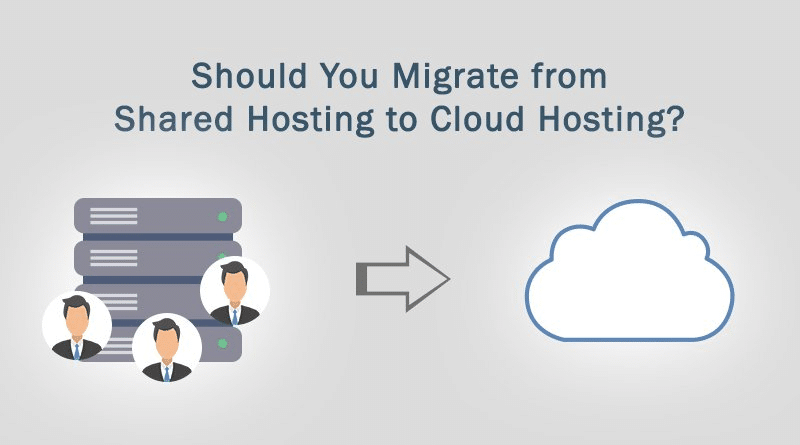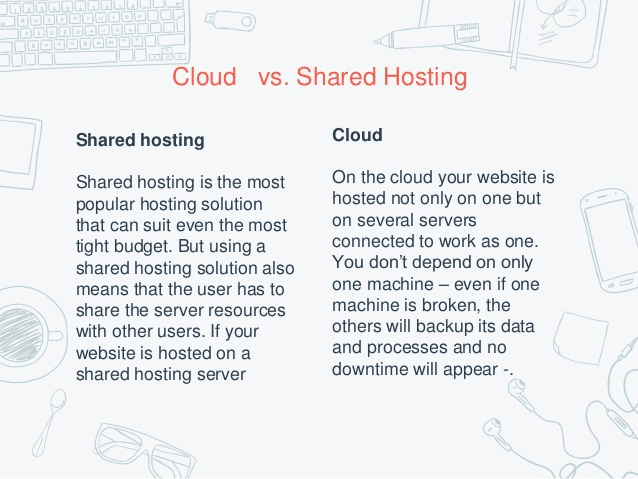When someone thinks of launching a new website project then they would want that nothing goes wrong with it. This state can be even more troublesome for someone putting their foot for the first time in the website business. They should not even think about launching their website without planning out about the hosting service for their baby website.
To keep your website sustaining in this technologically competitive era, you need a good and suitable web host provider. But there are so many hosting providers available in the market that selecting one of them can be so confusing. Not only different web hosting providers are confusing, but multiple kinds of hosting types are also becoming a big dilemma.
But this confusion dangles between cloud and shared hosting when the website relates to a small business or is a startup. The decision although depends on the very two important factors i.e. the number of resources and variant features required. But everyone needs a detailed study before jumping into any conclusion. Going through a detailed comparison between the two will help in selecting one rationally.
What is cloud hosting?
On a cloud hosting platform, there is not a set pre-defined set of hardware. Power is derived from a dynamically allocated resource system but these dynamic resources are placed across a widely spread network of physical components. It is managed through a cloud computing platform that is run over the internet. There will be other websites as well using the same power and resources but no physical connection is assured. A whole new level of stability and security is delivered but the fear of the effect of overload is dealt for a lifetime. This is so because the network of cloud servers is so uniquely designed that if one server goes down due to overload then another one instantly takes over. Such a level of scalability and reliability can only be assured by a cloud hosting provider.
What is shared hosting?
As the name suggests, multiple websites are hosted over a shared hosting platform. Starting from the bandwidth to storage, all the resources will be shared among all the websites being hosted on a shared host. It is obvious then that there would be a limit on the resources utilized by a specific website. This limit is decided and finalized by the hosting platform according to the shared hosting package. All the websites that are been hosted over a shared hosting server share the same amount of resources individually and have the same level of access. Shared hosting got popular as it is so affordable and helps so many websites to grow together been hosted on the same platform. Although shared hosting is one of the most prevailing types of hosting but it has its own set of disadvantages.
Now you have got to know the definition part of both so let’s get into the comparison part.

First of all, before choosing any one of both you should be clear about the type of customers that will refer to your website. Also, make a plan about the times at which traffic might spike exponentially as such instances will appear unannounced. There is a set of websites that should never opt for shared hosting service as a shared host will not be able to hold the traffic running in. This might lead to an unmetered loss and people might start losing interest and trust in your website like forever. To avoid situations like these, cloud hosting comes into rescue. Irrespective of the demands of other websites that are hosted with yours, it will take care of your sudden requirements too. It will allocate the extra resources available so that you don’t lose onto even a single customer.

Secondly, websites that house intensive applications, as it demands focused attention on the processing power and other resources as well. Resources that have been pulled into different directions will lead to the failure of your applications. Also, you would not want to struggle for the resources on a daily basis and your website won’t be able to run without them. Once your website is hosted over a shared platform, you have to get ready to experience service delays, and if not this then inconsistency performance is inevitable.
One thing is for sure if you fine-tune yourself with such delays in service, your user would not and will switch to some other application in no time. You will end up not achieving the desired set of deals and sales that you would have easily achieved through an appropriate cloud hosting provider’s service.
When on a cloud hosting platform, everything is managed from a central control panel, and applications are updated very frequently. The resources have been scaled as and when required and stellar performance is guaranteed. Hence, being the owner, the sole responsibility lies over you to choose the right host for your website.



